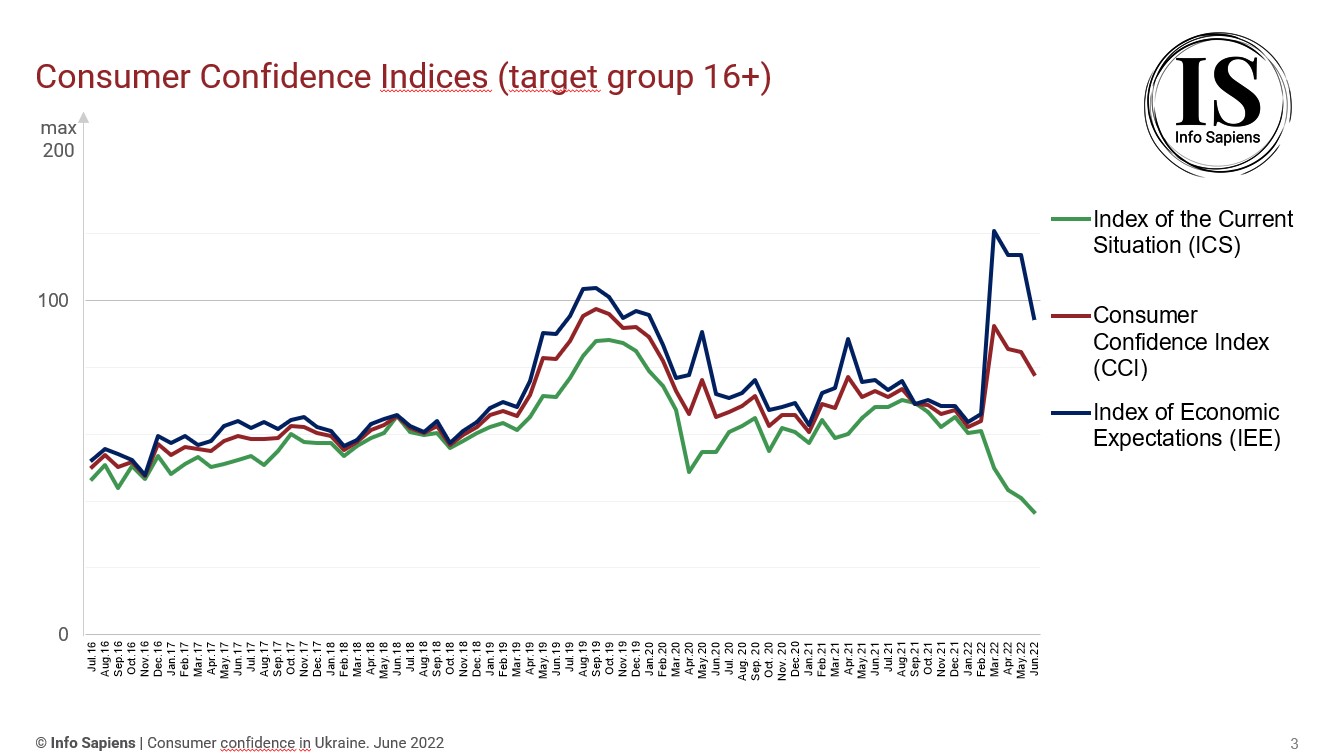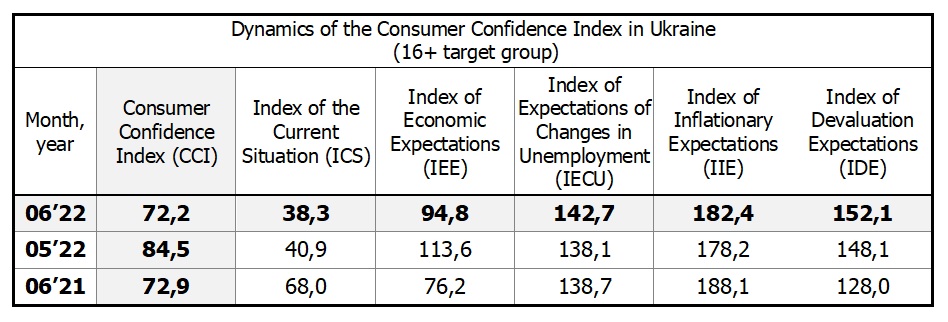According to the data provided by Info Sapiens “Consumer confidence of Ukrainians” in June, 2022, the Consumer Confidence Index of Ukrainians has decreased by 12,4 points and equals 72,2 points. All components of the indicator have decreased.
In June 2022, the Consumer Confidence Index (CCI) equals 72,2, which is 12,4 point lower than the indicator in May.
Index of the Current Situation (ICS) have decreased and equals 38,3, which is 2,6 p. lower than in May. The components of this index have changed as follows:
- – Index of Current Personal Financial Standing (х1) equals 33,6, which is 4,3 points lower than the indicator in May;
- – Index of Propensity to Consume (х5) decreased by 0,9 p. to the level 43,0.
In June, Index of Economic Expectations (ІЕE) decreased by 18,9 p. and equals 94,8. The components of this index have changed as follows:
- – Index of Expected Changes in Personal Financial Standing (х2) equals 71,1, which is 20,8 points lower than in May;
- – Index of Expectations of the Country’s Economic Development Over the Next Year (х3) in June equals 76,8, which is 20 points lower than in previous month;
- – Index of Expectations of the Country’s Economic Development over the Next 5 Years (х4) decreased by 15,9 points compared to last month and equals 136,4 p.
In June, the indicator of Index of Expectations of Changes in Unemployment has increased by 4,6 points and equals 142,7. Index of Inflationary Expectations increased by 4,4 point and equals 182,4 p. Expectations of Ukrainians regarding the hryvna’s exchange rate in the coming three months have worsened: Index of Devaluation Expectations increased by 4 p. and equals 152,1.
«In June, the downward trend in economic sentiment, observed at the beginning of the full-scale invasion of russia, continues. Because of this, the Consumer Confidence Index was abnormally high in the spring, while its component, the Index of the Current Situation, fell and continues to fall. In the event of a long war, we predict that the expectations of Ukrainians regarding the development of Ukraine's economy will continue to deteriorate, as well as the Consumer Confidence Index.» - as Info Sapiens analysts comment.


How the indices are calculated
The survey «Consumer confidence in Ukraine» was conducted by GfK Ukraine since June 2000. From 2019 this project is provided by Info Sapiens. From January 2009 consumer confidence survey is conducted on a monthly basis.
In Ukraine. the Consumer Confidence Index is determined through a random survey of domestic households. The poll involves 1.000 individuals aged 16+. (Up to April 2014 the poll involved 1.000 respondents aged 15-59). A representative sample is selected by gender and age, also by type and size of settlement. In April 2014 Autonomous Republic of Crimea was excluded from the sample of consumer confidence research in Ukraine. The margin of error is 3.1%. In April and May 2020, as well as in April 2021 due to lockdown, and from March 2022 due to hostilities, the survey was conducted by telephone interview with calls to mobile numbers. Dates of the latest survey: June 17-21.
To define the CCI, respondents are asked these questions:
- 1. How has the financial standing of your family changed over the last six months?
- 2. How do you think your family’s financial standing will change in the next six months?
- 3. Looking at economic conditions in the country as a whole, do you think the next 12 months will be good or bad?
- 4. Looking at the next five years, will they be good ones or bad ones for the country’s economy?
- 5. In terms of large purchases for your home, do you think now is generally a good time or a bad time to make such purchases?
- • index of Current Personal Financial Standing (x1);
- • index of Expected Changes in Personal Financial Standing (x2);
- • index of Expected Economic Conditions in the Country Over the Next Year (x3);
- • index of Expected Economic Conditions in the Country Over the Next 5 Years (x4);
- • index of Propensity to Consume (x5).
- • consumer Confidence Index (CCI) as the arithmetic average of indices x1–x5;
- • index of the Current Situation (ICS) as the arithmetic average of indices x1 and x5;
- • index of Economic Expectations (IEE) as the arithmetic average of indices x2, x3, and x4.
- 1. Do you think that within next 12 months the number of unemployed (people who do not have job and are looking for work) will increase, will remain roughly the same, or will decrease?
- 2. How do you think that prices for major consumer goods and services will change in the next 1–2 months?
- 3. How do you think the USD value will change towards the UAH value during the next 3 months?
Each of these questions is related to a corresponding index:
Indices are constructed thus: the share of negative answers is deducted from the share of positive answers, and 100 is added to this difference in order to eliminate negative values. On the basis of these five indices, three aggregate indices are calculated:
Index values range from 0 to 200. The index equals 200 when all respondents positively assess the economic situation. It totals 100 when the shares of positive and negative assessments are equal. Indices of less than 100 indicate the prevalence of negative assessments. To determine the Index of Expected Changes in Unemployment (IECU), the Index of Inflationary Expectations (IIE) and the Index of Devaluation Expectations (IDE), the respondents are asked these three questions:
The IECU, the IIE and the IDE are calculated thus: the share of answers that indicate a decrease of unemployment/inflation/devaluation is subtracted from the share of answers that indicate the growth of unemployment/inflation/devaluation, and 100 is added to the difference to eliminate negative values. The values of indices can vary from 0 to 200. The index totals 200 when all residents expect an increase in unemployment/inflation/devaluation.
Link to download a press release and presentation
*Note - the data was corrected on August 12, 2022
